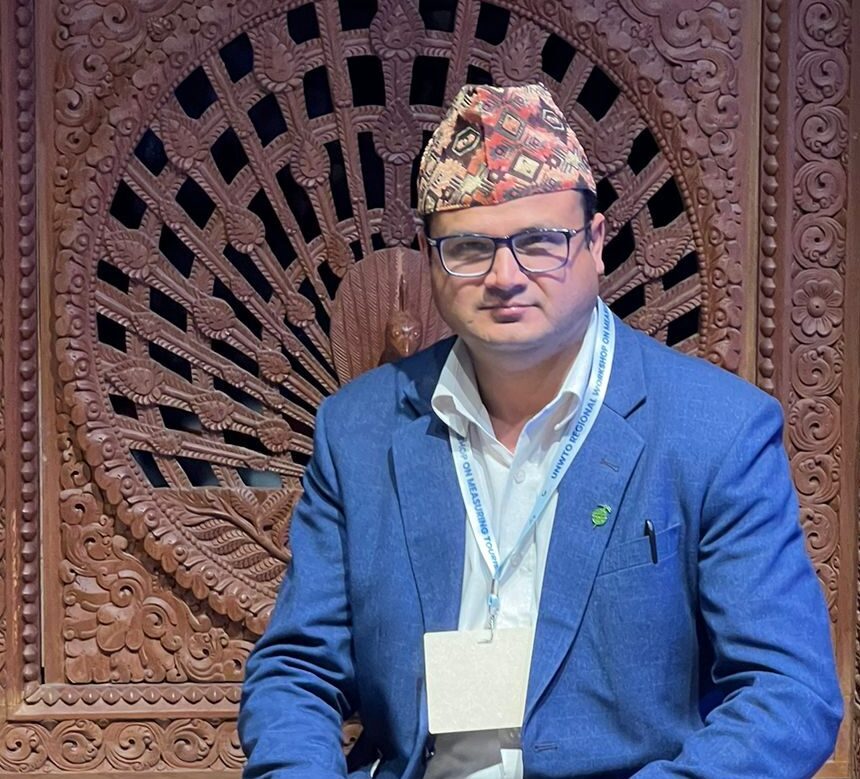
Founder & CEO
Need quick info or have a custom query?
We’re just a message away!
Tihar, also known as Diwali or Deepawali, is a vibrant five-day Hindu festival observed throughout Nepal. Known as the festival of lights, homes are decorated with diyas and decorative lights, creating a breathtaking sight at night. Candles and lanterns are lit in honor of Laxmi, the goddess of wealth, prosperity, and fortune. Tihar usually takes place in the Nepali Kartik month (October to November on the Lunar Calendar) and is Nepal’s second-most important festival after Dashain.
This festival honors not only humans and deities but also animals such as crows, cows, and dogs who have close relationships with humans. Detailed Rangoli patterns, made of colored rice, dry flour, sand, or flower petals, adorn the floors of homes, serving as sacred spaces for Hindu deities, particularly Goddess Laxmi.
Each day of Tihar holds its own significance. On the first day, people offer rice to crows, believed to be messengers of death. The second day honors dogs, believed to be the guardians of the god of death. The third day is dedicated to Goddess Laxmi. The fourth day honors cows. On the fifth day, brothers and sisters exchange Tihar quotes (Tihar Tika) and gifts, symbolizing the divine bond between humans and animals.
Today is the first day of the festival. On this day, you can observe people offering food to the crows, “the messenger of death,” so that they will inform them of the bad news in the coming year. Also, you can roam around the town and marketplaces and observe the street lights being set up.
Includes: Private Transport, an English-speaking tour guide, and an overnight accommodation at Yatri Suites & Spa or a similar hotel in Kathmandu.
The second day of the Tihar Festival is called Kukur Tihar. On this day, you can watch many Nepalese families honoring dogs, for they believe that the dog can guarantee the souls of the dead getting to heaven. In Nepal, the dog plays an important role as “the gatekeeper of death,” which is said to lead the deceased across the river of death in the underworld. On Kukur Tihar, Nepalese will present beautiful garlands to the dogs and paint their foreheads in red cinnabar to thank them for their contributions. Later, you can visit the streets and enjoy the festive atmosphere.
Includes: Breakfast, Private Transport, an English-speaking tour guide, and an overnight accommodation at Yatri Suites & Spa or a similar hotel in Kathmandu.
On the third day of the Tihar Festival, Nepalese often worship cows and Laxmi, the goddess of wealth. This day is also the most important holiday in the festival. People would get up early and clean the room thoroughly. Hence, they start to thank cows. After a cozy bath, those cows will wear red tika and beautiful wreaths, with holy strings from the priest tied to their tails.
When the night falls, dazzling candles, oil lamps, and bright lights are lit up at the doors, steps, and even on the roof. All the Nepalis will make their home as luminous as possible to attract Laxmi’s attention. If the day happens to be Saturday, shops and stores won’t follow the traditional practices and will keep open to welcome the goddess of wealth. At this moment, Nepali kids won’t be idle. They come to visit neighbors in small groups and sing Tihar songs like Bhailo and Deusi for blessings. In return, the house owner gives them money, fruit, and sweets.
Includes: Breakfast, Private Transport, an English-speaking tour guide, and an overnight accommodation at Yatri Suites & Spa or a similar hotel in Kathmandu.
On the fourth day of Tihar, people from various cultural backgrounds will remember various occasions. People perform Goru Puja for oxen because they are indispensable helpers to farmers. Cow dung, considered the representative of Govardhan Mountain, is worshipped during Govardhan Puja. In addition, the Newar community in Kathmandu Valley celebrates this day as the start of the new year. All Newars will gather for this festival and perform the Mha Puja to worship themselves.
On this particular day, the older father would draw two geometric figures. One is painted to bless the entire family, while the other commemorates the death of Yama and his messenger. Then everyone will have a special family feast and eat some blessed food, such as boiled eggs, fried fish, delicious desserts, and so on. Following the grand banquet, they will take turns worshiping Yama Panchak’s death and exchanging Tihar gifts to pray for good luck the following year.
Includes: Breakfast, Private Transport, an English-speaking tour guide, and an overnight accommodation at Yatri Suites & Spa or a similar hotel in Kathmandu.
The last day of Tihar is referred to as Bhai Tika. On this day, brothers and sisters will gather to receive Tihar Tikas on their foreheads. After placing the multi-colored tika and splendid garlands on the brothers, the sisters would bless them for their well-being and success and give them some Shaguns (a type of candy) as a Tihar gift. The brothers would then perform the same ritual, putting tika on their sisters and giving them some gifts in exchange for the blessing. This celebration has strengthened the bond between brothers and sisters. This is the end of the festival.
Includes: Breakfast, Private Transport, an English-speaking tour guide, and an overnight accommodation at Yatri Suites & Spa or a similar hotel in Kathmandu.

Nilhari Bastola
Founder and CEO
👋 Hello! Thank you for reaching out. Let me know how I can assist you—I'm happy to help.
Talk To Me
🟢 Online | Privacy policy
Contact Us
